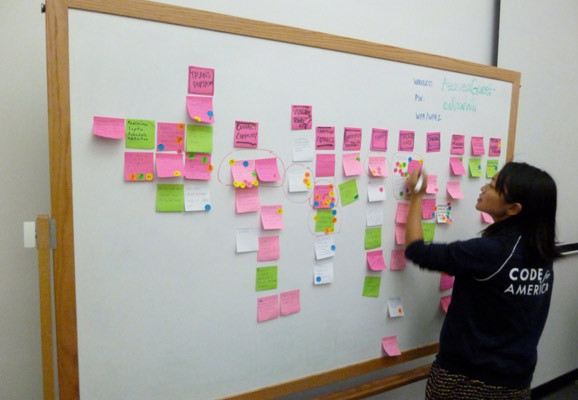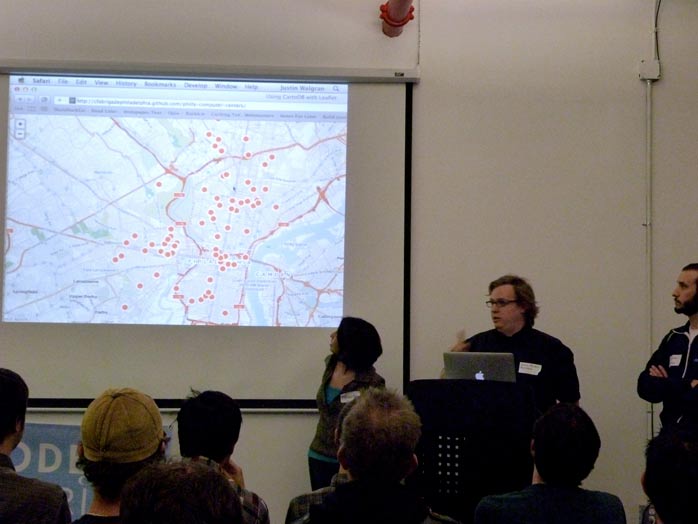Using public city data and open source code, around 70 people spent Saturday in Callowhill at Azavea headquarters and collaborated on a series of apps that address some of Philly's most pressing issues, as part of Code Across America: Philadelphia's Civic Hackathon.
“The reason this is blowing up is because it's tapping an untapped well of people who write code and want to give back but don't know how,” said Alex Yule, a 2012 Fellow at Code for America (CfA), a nonprofit that seeks to make government more efficient through technology and civic engagement. According to Yule, the event drew a well-balanced number of coders as well as non-developers.
Yule, along with Fellows Elizabeth Hunt and Michelle Lee, hosted the event as part of their five week-long stint in Philadelphia. It was also part of Code Across America, a week-long series of civic hackathons taking place in 16 cities. Civic hackathons bring together developers, urban enthusiasts and city representatives to create apps that improve the city through more accessible and transparent data.
Representatives from the Office of the Mayor, SEPTA and Comcast were in attendance throughout the day to offer their support, knowledge and coding skills. In the afternoon, Mayor Michael Nutter dropped by to see what people were working on.
“I love the atmosphere here,” said Rob Jefferson, a researcher at Solutions for Progress, Inc. “It's free-flowing, and there are lots of ideas and different backgrounds. That's the strength of hackathons.”
Jefferson was part of an 11-person team – by far the largest of the day – that came up with ReclaimPhilly, a web app that maps current vacant land information. “There are a lot of vacant properties in Philadelphia,” he said. “Growing up in Chicago, where there are lots of them, it made me distressed to see them here, in 2012.”
Another group of hackers tackled the issue of lobbying in Philadelphia. They created Lobbying.ph in order to “help citizens better understand the influence of lobbying in their city.” The website, which took first place on the day, captures data about lobbyists, their supporters, and their quarterly financial reports.
The proliferation of vacant lots, accessibility to computers and Internet, and the need for a “master” source of all transportation data were just a few of the issues that sprung up at the hackathon.
“They were a good representation of issues in Philly,” said Tim Wisniewski, an Assistant Managing Director for the City of Philadelphia. “We're getting ideas not just from coders but also city workers, coders and nonprofits.”
The raw energy, talent and innovation in the room – and the city at large – inspired Luke Burns and his team to propose a web platform that brings people with diverse interests together to encourage collaboration and affect change. “Everything I do comes from this need to create opportunities, because there's a lot of lost potential,” said Burns, a high school senior from Harleysville.
At the end of the day, as everyone made their way to The Trestle Inn for a post-coding happy hour, promises were made to continue working on and maintaining the newly created apps, and Twitter handles and contact information were exchanged.
“Our number one goal is to connect these people in the world, so that they can continue to work together when we're not here,” said Hunt.
IVANA NG is a freelance writer based in Philadelphia. Originally from New York City, she enjoys writing about education, technology and the arts. Send feedback here.
Photos by Ivana Ng
Code for America fellow Michelle Lee facilitates a brainstorming session.
Philly Computer Centers demos its app, which locates public computer facilities near the user.


